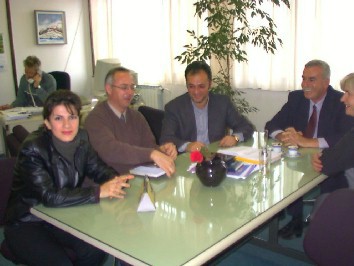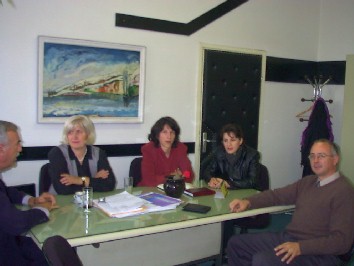Steering Committee
members:
-
Jove Jankulovski - Project Manager, iEARN Macedonia
-
Mimoza Jankulovska - Project Co-ordinator for Macedonia, iEARN Macedonia
-
Aleksandar Markovski -member of the Steering Committee, iEARN Macedonia
-
Leticia Papa - Project Co-ordinator for Albania, Hurry T. Fultz, Albania
-
Ilia Cili - member of the Steering Committee, Hurry T. Fultz, Albania
Lidija Topuzovska - Secretary General national commission of UNESCO from Macedonia - advisor
Minutes from the First meeting of the
Steering Committee of the Project
Building Bridges over Borders by Using ICT and PBL
Bitola,
Macedonia, November 13 and 14, 2001
Leading Institution/Partner:
Civic Association International Education and Resource Network - Macedonia - iEARN Macedonia
Project Partner:
Technical School -
Hurry T. Fultz, Albania
-
Expected outcomes - It was decided that bullets in project proposal in this item should be changed into:
-
To train 4+1 (country coordinator) trainers and staff per IEC in Macedonia and
Albania - main aspect of this point is that people should meet and agree how they can cooperate better (more to meet each-other than to train them). Meeting date is set for 28-29. 11. 2001 and place should be decided later. -
To train 10 adults and 20 young people per country how to use ICT and how to participate in on-line collaborative projects (this should be done on the meeting which is mentioned before)
-
To identify at least 2 on-line collaborative projects in which youth from both countries will be participating in (themes like: night life, alcohol, drugs, love, etc., but not too much items in order not to have too few contribution or almost no discussion)
-
Other points of the expected outcomes are taken as they are proposed.
-
Risk assessment
-
Insurance in Albania. Harry T. Fultz have guards (they are paying a lot for private insurance companies). So, they have to give some kind of a document, because they are not going to insure the equipment, because it is “already” insured, and the money for that purposes are going to be dedicated to something else.
2.
Equipment
-
Offers from Albania were compared, but if there is no way to transfer the money to Albania, the equipment will come to Albania from Macedonia like:
- Donation, or
- Re-exported to Albania from Macedonia (depends of the taxes)
Albanian partner should
explore about possible ways of delivery and give immediate
feedback
about local taxes for computer equipment, and what will be the costs for
receiving donation from Macedonia. In both cases Albanian partner should
prepare documentation for quick customs clearance and transportation to
its premises,
where equipment will be installed.
Connectivity:
-
Harry T. Fultz have a satellite connection to Internet
-
Harry T. Fultz need to explore and provide/give a document for the ISDN dial-up
prices for 64 kbit/s, or 128 kbit/s.
-
Both sides should explore about the prices for training of 2 people
(technical personal) -
Albanians are going to find their needs of the trainings (for ICT etc.).
-
Technical Training - it will be contracted.
-
Winter holidays in Albania are: December 24 January 06.
-
Winter holidays in Macedonia are: January 01 January 13.
-
All activities are in the Timeframe (Appendix B). At this point 3 dates are fixed
in the calendar are: -
November 28, 29, ’01 meeting of the teams in order to develop joint project ideas,
and to develop joint action plan. When working on action plan need to keep in
mind winter holidays and other fixed dates. Albanian partner should explore
prices for accommodation and food, and visa. -
On-line collaborative project work should start no later than December 10, ’01.
-
First exchange of students and staff should be done in the second week on
January. Suggested dates for first exchange are January 11-14, ’02 (Thursday
through Sunday). -
Second exchange depends on involvement of Bulgarian partner.
-
Both sides should economize as much as possible, especially at the beginning.
-
Hurry T. Fultz supposes to check how much is the visa for Macedonian people
who travel to Albania (in opposite direction it costs 5 US$). -
Both sides should have evidence of monthly gross incomes for the members of
the Steering Committee and other project staff of the project. -
Final evaluation - both sides should find some institution, which is going to make external evaluation (the costs requested by this institution).
-
Item D.b. Promotional materials - for the beginning 1000 leaflets in Macedonian, Albanian and English (Jove will prepare the text in English and he’s going to send
it to the Albanian side to correct it and to send the Albanian language version back.)
-
The prepared text for reporting outline of the project was looked (developed by Jove
and attached to minutes) from point to point. Each point was discussed in order to
work on reporting from the very beginning due to time constraints. -
At the meeting of 2 teams of the project (end of November), questionnaires for the evaluation of the project need to be developed. There should be questionnaires for students, teachers, administration/management, parents, and interested individuals. These questionnaires should be of so-called closed type - question is followed by alternatives. Person should only mark one of the offered options. Also, during each training session, exchange, meeting or gathering of any type we need to have
feedback forms that will ask about the event itself, but also ask participants about
their attitude towards the project idea, the outcomes of the project, and why this initiative is different from the other projects? (What is the added value here, what
is its impact?). These testimonies, stories, statements should be used for promotion, presentation, web, reports and other purposes. -
III.E. About this point in reporting outline was said that different open themes
should be opened and that suppose to be on the Web. (see previous item) -
The outlines of training sessions - which are their visions, what they think about different open themes etc.
-
Importance of sustainability plans was stressed.
and successes. Jove should to send to the Albanian partner rules for making successful
Web site, if they need them. Albanian partner need to detect whether web design
training is needed or not?
BUILDING BRIDGES OVER BORDERS
9.
Evaluation
-
Questionnaires for the evaluation of the project need to be developed. There
should be questionnaires for students, teachers, administration/management,
parents, and interested individuals. These questionnaires should be of so-called
closed type question is followed by alternatives. Person should only mark one of
the offered options. Also, during each training session, exchange, meeting or
gathering of any type we need to have feedback forms that will ask about the
event itself, but also ask participants about their attitude towards the project idea,
the outcomes of the project, and why this initiative is different from the other
projects? (What is the added value here, what is its impact?). These testimonies, stories, statements should be used for promotion, presentation, web, reports and
other purposes. -
External evaluators should be hired.
-
All these outcomes, and success stories, testimonies should be published on
the web. Statistics related to the impact should be on the web too.
Photo from the steering committee


This web page have been created with the support of
UNESCO's INFOYOUTH programme.